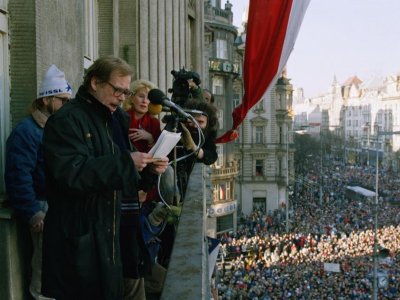
THE SPIRIT OF 89
The Day of Pentecost finds an echo in the secular revolutions of recent history.
There have been several revolutions in the modern era. The French republican revolution of 1789, the Russian communist revolution of 1918, the Iranian Islamic revolution in 1979 and the East European democratic revolution which happened twenty years ago this year are four of the most influential. The curious thing is the way that shades of these revolutions can be seen in the events of Pentecost.
In revolutions, people are drawn from the margins into the centres of power. This was seen majestically in Eastern Europe in 1989 when it was the poets, philosophers and rock musicians who, if only temporarily, took hold of power when no-one knew who was in charge. Perhaps these people were able to adapt more quickly to an altered reality because of their less bureaucratic mindset and were publicly acclaimed because many of them had dissented from communist doctrine. Vaclav Havel is a good example of this, though he endured politically for a decade. The early disciples were drawn from the fringes of Galilee and had no stake in the system, unlike the religious hierarchy in Jerusalem.
In revolutions, new and once unsavoury ideas gain ascendancy. Republicanism – once reviled – took hold in France and Russia. In the early Church, the inclusion of the Gentiles and the loosening of restrictions in Jewish law were radical ideas which created tension and controversy. People find it hard to assimilate big changes rapidly, but this is essential when you are in the middle of a revolution.
Revolutions also generate real intensity in relationships. People are more spontaneous, though how this is perceived may depend on your cultural background. Many westerners found the seething crowds massed in Tehran during the Islamic revolution thirty years ago rather frightening, but cried with happiness when similar numbers gathered in Wenceslas Square in Prague twenty years ago. In the early Church it was precisely the sense of joyful community which attracted outsiders into the ranks.
New attitudes to property are created in revolutions. Often this happens violently, as when the Bastille and the Winter Palace were stormed. There is theft on a grand scale – none larger in human history than the kleptomania which gripped Russia in the early 1990s as colossal state assets found their way into private hands by shady deals. Yet the new arrangements soon get enshrined in law. In the early Church the disciples held everything in common for each to use according to their needs. It was a breathtaking development, but it didn’t last. In fact disputes soon arose between the Jewish and Greek constituencies over the distribution of welfare.
Most Christians today, in common with wider society, lead cautious lives, guarding their relationships, property and reputations and prefer slow, incremental changes to their environment. Yet sometimes the work of God in revival does not afford us this. Jesus said: For those who want to save their lives will lose it, and those who lose their life for my sake will find it (Luke 9:24). One of the alarming aspects of revolution is the way people have to let go of almost everything which gives them security in life. And yet a similar call by Jesus is an unexceptional part of his teaching. Letting go of our lives for God to use is a decision we would rather defer, but it is something we are called to now. In Christianity, the revolution is personal.
POPULAR ARTICLES

Obama's Covert Wars
The use of drones is going to change warfare out of all recognition in the next decades.

Through A Glass Starkly
Images of traumatic incidents caught on mobile phone can be put to remarkable effect.

What Are British Values?
Is there a British identity and if so, what has shaped the values and institutions that form it?


